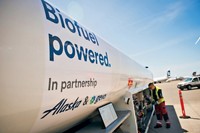Advertisement
Grab your lab coat. Let's get started
Welcome!
Welcome!
Create an account below to get 6 C&EN articles per month, receive newsletters and more - all free.
It seems this is your first time logging in online. Please enter the following information to continue.
As an ACS member you automatically get access to this site. All we need is few more details to create your reading experience.
Not you? Sign in with a different account.
Not you? Sign in with a different account.
ERROR 1
ERROR 1
ERROR 2
ERROR 2
ERROR 2
ERROR 2
ERROR 2
Password and Confirm password must match.
If you have an ACS member number, please enter it here so we can link this account to your membership. (optional)
ERROR 2
ACS values your privacy. By submitting your information, you are gaining access to C&EN and subscribing to our weekly newsletter. We use the information you provide to make your reading experience better, and we will never sell your data to third party members.
Environment
GM Backs Ethanol Start-Up Coskata
Company claims its technology can significantly lower the price of the fuel
by Michael McCoy
January 15, 2008

General Motors is investing in Coskata, a start-up biofuels company that says it can produce ethanol from a wide range of feedstocks for less than $1.00 per gal, compared with a wholesale selling price of more than $2.00 per gal today.
A partnership between the two companies was revealed Sunday, Jan. 13, at the North American International Auto Show in Detroit. "We are very excited about what this breakthrough will mean to the viability of biofuels and, more important, to our ability to reduce dependence on petroleum," said GM Chief Executive Officer G. Richard Wagoner Jr.
Warrenville, Ill.-based Coskata was founded in 2006 by Todd Kimmel, a former venture capitalist, and Rathin Datta, a Ph.D. chemical engineer who previously founded Vertec Biosolvents, a marketer of biologically derived solvents. Coskata's initial funders were Advanced Technology Ventures, GreatPoint Ventures, and Khosla Ventures.
Although most ethanol made in the U.S. today comes from corn kernels, the Bush Administration is promoting the use of cellulosic feedstocks such as corn stalks and wood waste that don't cut into the food supply. Coskata says its process can consume virtually any carbon-based feedstock, including municipal waste, old tires, and agricultural waste.
To date, much of the focus in cellulosic biofuels has been on biochemical processes. These approaches use enzymes to break down cellulose into sugars, which are then fermented into ethanol.
In Coskata's process, feedstock is gasified into syngas???a mixture of carbon monoxide and hydrogen???using conventional gasification technology. In the next step, the syngas is sent to a bioreactor where microorganisms consume the two gases, excreting ethanol as a waste product. In a third step, membranes are used to separate the ethanol from water.
According to Coskata, an Argonne National Laboratory analysis of its process found that it generates up to 7.7 times more energy than it consumes, compared with just 1.3 times for corn ethanol. Moreover, the firm claims that its process uses less than a gallon of water to make a gallon of ethanol, compared with 3 gal or more for other processes.
Coskata is drawing on the chemical industry for its management team. Its CEO is William Roe, who joined the company last September after 29 years with the water treatment chemicals firm Nalco. Coskata's Vice President for R&D and engineering is Richard E. Tobey, a 28-year veteran of Dow Chemical.
"We will have our first commercial-scale plant making 50 million to 100 million gal of ethanol running in 2011, and that includes the two years it will take to build the plant," Roe said at the auto show. He added that Coskata could account for a "significant portion" of the 21 billion gal of biomass ethanol called for by 2022 under the Energy Independence & Security Act, which President George W. Bush signed last month.



Join the conversation
Contact the reporter
Submit a Letter to the Editor for publication
Engage with us on Twitter